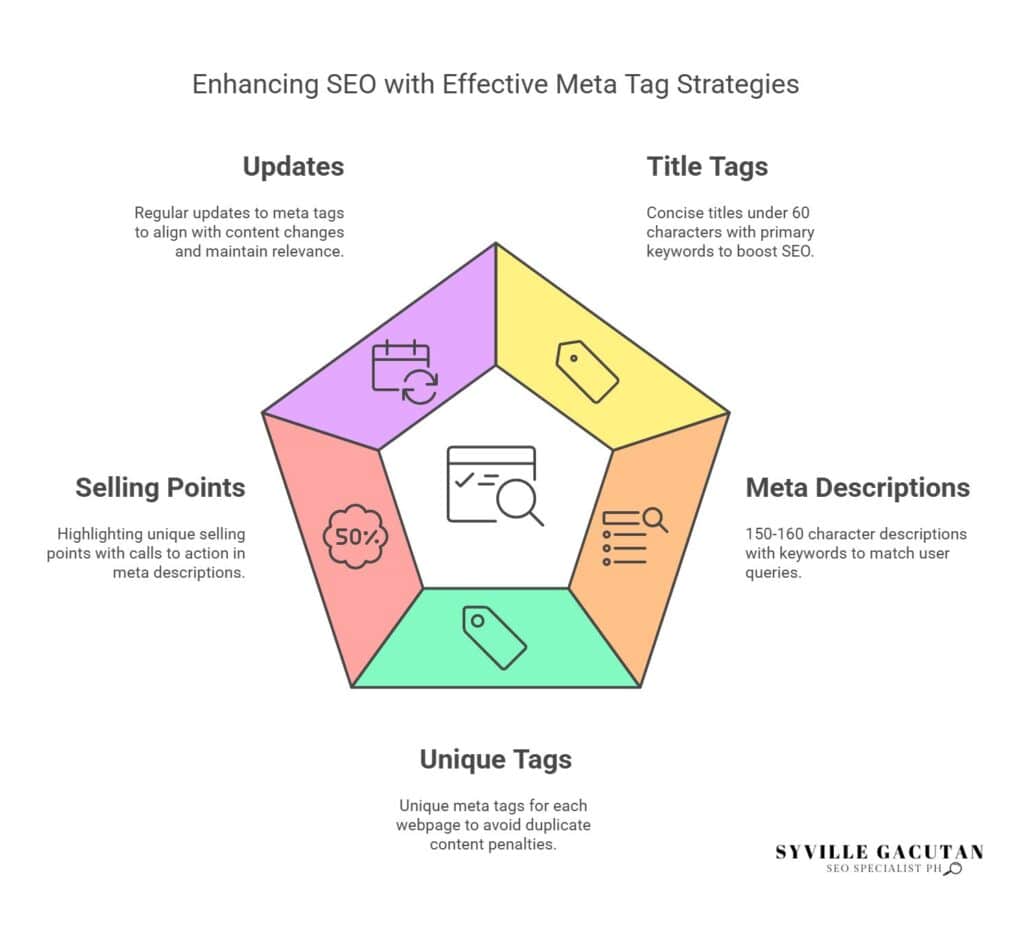
To optimize SEO meta tags and boost your website’s visibility, focus on these three essential tips: First, keep your title tags concise and descriptive. Stay under 60 characters and include relevant keywords prominently for better search engine ranking; Second, write compelling meta descriptions that effectively summarize your page content. Highlight unique selling points and add calls to action, all within 150-160 characters for optimal display. Lastly, avoid duplicate meta tags to prevent confusion among search engines and users, thereby improving search engine rankings and user experience. Doing so will enhance your site’s competitiveness online. Explore further to know how to optimize meta tags for SEO.
Key Takeaways
- Keep your title tags concise, under 60 characters, and start with primary keywords to improve your SEO ranking.
- Create meta descriptions that are 150-160 characters long, including relevant keywords to match user queries.
- Ensure each webpage has unique meta tags to enhance search engine understanding and avoid duplicate content penalties.
- Highlight unique selling points in meta descriptions with compelling calls to action to entice users.
- Keep your meta tags up to date to match any content changes and ensure your SEO efforts stay effective. Regular updates help maintain relevance and boost your optimization.

Understanding Meta Tags
Meta tags serve as the digital signposts of a webpage, providing essential context to search engines about what the page covers and aims to achieve. These snippets of HTML code plays a vital part in how search engines understand and rank content your website, directly impacting your seo performance. Understanding meta tags in seo is vital for any webmaster aiming to enhance online visibility and drive traffic.
Among the important meta tags, the meta description tag stands out as a key element. This tag offers a quick snapshot of the webpage content and is often displayed as a snippet in search engine results pages (SERPs). Crafting a compelling meta description can significantly sway a user’s choice to click on your link. To get the best out of your meta tags, make sure your meta description is concise, relevant, and includes targeted keywords without overstuffing.
In addition to the meta description tag, title tags and header tags are also paramount. The title tag should encapsulate the primary topic of the page, while the header tags (H1, H2, etc.) organize the content and signal its hierarchy to search engines. By optimizing these important meta tags, you provide a structured and clear context that search engines can easily interpret, enhancing the chance of achieving higher rankings.
Crafting meta tags strategically boils down to clarity and relevance. When you focus on these key elements, your SEO performance gets a boost, making your site more appealing to both search engines and users. Getting the hang of these principles and applying them is essential for winning at digital marketing.
Importance and Impact on Website

Understanding how meta tags function paves the way for recognizing their importance and impact on a website’s performance. Meta tags are crucial elements in SEO strategies, as they influence search engine visibility and user engagement. By incorporating an optimized title tag and a well-crafted meta description, websites can significantly enhance their attractiveness to search engines and users alike. These tags serve as a concise representation of the page’s content, offering both search engines and users a snapshot of what to expect.
The impact of meta tags on SEO cannot be underestimated. Search engines utilize these tags to understand the context and relevance of a webpage, directly affecting how it is indexed and ranked. An optimized title tag is particularly vital, as it is often the first impression a user has in search results. The meta description offers a brief overview that can draw users in, boosting click-through rates and driving more conversions.
Below is a table summarizing the importance and impact of meta tags on SEO:
| Meta Tag Component | Impact on SEO |
| Title Tag | Influences search ranking |
| Meta Description | Enhances click-through rates |
| Keywords | Contextual relevance |
| Alt Attributes | Image optimization |
| Robots Meta Tag | Indexing control |
Understanding and implementing these components effectively is crucial for developing a successful SEO strategy. By acknowledging the importance for SEO, webmasters can leverage meta tags to improve their site’s visibility and performance. Deliberate attention to these elements ensures that a website stays ahead in the constantly changing digital world.
1. Optimizing Title Tags Effectively

The title tag serves as the gateway to your website, acting as a critical component in capturing both user interest and search engine relevance. As a crucial SEO meta tag, the meta title is often the first glimpse users have of your content in search results. Therefore, optimizing these tags is essential for enhancing SEO ranking and ensuring your site stands out in the crowded digital landscape.
To optimize your title tags effectively, focus on creating concise and descriptive titles that accurately reflect the content of your page. The perfect title tag length falls between 50-60 characters, which ensures that it is displayed fully on search engine results pages (SERPs) without getting cut off. This length allows you to convey the essence of your content while incorporating primary keywords that align with user search intent.
In addition to length, the placement of keywords within the title tag is vital. Prioritize placing your primary keyword at the beginning from the title since search engines usually give more weight to words closer to the start. This strategic placement not only improves SEO ranking but also aligns with user behavior, as individuals often skim through titles to find relevant information quickly.
Also, make sure every page on your site has its own unique title tag. Duplicate title tags can mess with search engines and weaken your SEO. By creating unique meta titles for each page, you help search engines grasp the specific value each page brings, boosting your site’s visibility and relevance in search results.
2. Craft Compelling Meta Descriptions

Elevate your website’s click-through rate by crafting compelling meta descriptions that capture the essence of your content while enticing users to explore further.
Meta descriptions, though not a direct ranking factor in search engine algorithms, significantly influence user behavior and play a crucial role in optimizing meta tags for SEO. They are the brief snippets under the title and description on search engine results pages (SERPs) that act as a window into the content of your page, impacting both SEO and user experience.
To effectively craft a meta description, ensure it precisely encapsulates the core message of your content. Use this opportunity to highlight unique selling points or compelling calls to action that prompt users to click. This is where understanding your audience’s intent becomes paramount.
By optimizing these tags with relevant keywords, you create an alignment between user queries and your content, increasing the likelihood of engagement.
Length is another vital consideration in crafting meta descriptions. Aim for a concise yet informative description, ideally within 150-160 characters, to ensure full visibility on SERPs. This ensures that the entirety of your message is conveyed without being truncated, maintaining its persuasive power.
In essence, an effective meta description should not only reflect the content’s relevance to the user’s search but also provide an inviting preview that encourages further exploration.
3. Avoid Duplicate Meta Tags

Meta tags play a crucial role in guiding search engines to understand your website’s content, but the presence of duplicate meta tags can significantly hinder this process. When search engines encounter duplicate meta tags, it can lead to confusion, potentially resulting in lower search engine rankings. Thus, ensuring that your meta tags are unique and precise is paramount for effective SEO performance.
Meta tags are powerful because they help search engines understand your webpage’s content and purpose. This understanding can improve how your page is indexed and ranked, making it more visible to users searching for related topics. Unique meta tags are essential as they allow each webpage to stand out, providing a distinct descriptor that can improve visibility in search engine results. By avoiding duplicate meta tags, you not only enhance the clarity of your web content but also increase the likelihood of attracting relevant traffic.
To create meta tags effectively, it’s vital to tailor each tag to the specific content of the webpage it represents. This involves crafting unique meta descriptions and titles that accurately reflect the page’s theme and keywords. Utilizing tools that analyze your site’s meta tags can help identify duplicates and ensure that each tag serves its intended purpose.
Avoiding duplicate meta tags is a fundamental step in optimizing your SEO strategy. Creating unique meta tags helps search engines understand and rank your content better, ultimately attracting more targeted traffic to your site.
Final Thoughts
Optimizing SEO meta tags is a foundational step in improving your website’s search engine visibility and user engagement. By focusing on clear, concise title tags, compelling meta descriptions, and avoiding duplicate content, you ensure that both search engines and users understand the value of your pages. Regularly reviewing and updating these tags to reflect content changes will keep your SEO strategy effective.
If you want to ensure your website’s meta tags are perfectly optimized for maximum SEO impact, connect with Syville Gacutan, an experienced SEO Specialist in the Philippines. Syville can help you craft powerful, keyword-rich meta tags that boost your search engine visibility and drive more traffic to your site. Take your SEO strategy to the next level—reach out to Syville today.